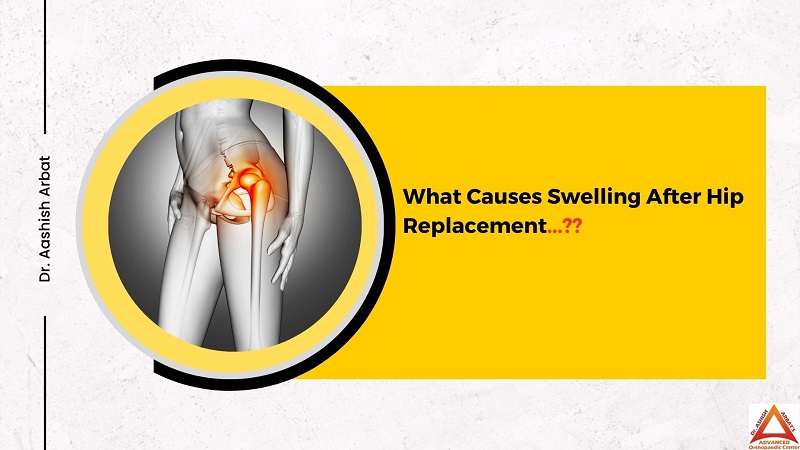
Why is my foot swollen after hip replacement? Swelling is a normal and natural body reaction to the stress the tissues go through during hip replacement surgery. The surgical procedure entails removing the diseased head of the femur (thigh bone) and the arthritic bone in the acetabulum (hip joint cavity), followed by replacing these sections with metal and high-grade plastic prosthetics.
Let’s delve into what causes swelling after hip replacement and how to control it.
Contents
What Causes Swelling After Hip Replacement?
The surgical incisions cause an inflammatory reaction, in which the body sends millions of repairing cells to restore the tissues.
The following factors are primarily swelling responsible:
- Surgical Trauma: The surgical process traumatizes the tissues surrounding the hip joint. This trauma causes an inflammatory response, resulting in tissue swelling as the body attempts to repair the damage.
- Fluid Accumulation: Water retention after hip replacement surgery is common, resulting in postoperative hip swelling. The body generates additional fluid (or water) to restore the surgical site throughout the healing process. This fluid can accumulate, causing swelling in the hip and, in some cases, the leg and foot.
- Poor or Decreased Mobility: Patients’ mobility typically decreases after surgery. This inactivity can contribute to fluid accumulation in the lower extremities, resulting in swelling.
- Blood Clots: Rarely, blood clots can form after hip replacement surgery, causing swelling. This is a critical condition requiring immediate medical care.
Hip Replacement Swelling Complications
Although swelling is a normal part of the recovery process after hip replacement surgery, certain complications may occur in some cases:
- Hematoma: Blood accumulation at the surgical site, resulting in an enlarged or swollen mass.
- Infection: Signs of infection include pain, redness, and heat or inflammation.
- Deep Vein Thrombosis (DVT): Symptoms of DVT, a blood clot in a deep vein, include swelling, pain, and tenderness in one leg.
Preventing complications requires early diagnosis and treatment. Monitor and report any unusual or troubling symptoms to the medical team immediately.
How Much Swelling is Normal After Hip Surgery?
Swelling depends on an individual’s health, surgical technique, and physiological reaction.
Swelling 3 months after hip replacement surgery is a normal part of the healing process for many patients. In contrast, experiencing leg swelling 2 years after hip replacement is not typical and may require further evaluation by a medical professional. Overuse, infection, or hip arthrofibrosis—excessive scar tissue surrounding the joint—could cause it.
Consult Dr. Aashish Arbat, Orthopedic Doctor in Pune, if the swelling persists for over a few weeks or caused due to other symptoms such as severe pain, redness, or fever.
How to Reduce Swelling in Leg After Hip Replacement?
Managing and reducing swelling after hip replacement surgery is possible through the use of several effective strategies, such as:
- Elevation: Raising the afflicted leg above the level of the heart encourages fluid outflow, which reduces swelling.
- Compression: Wearing compression stockings can help prevent fluid accumulation in the legs and reduce swelling.
- Physical Therapy: Gentle exercises and physical therapy enhance mobility and fluid circulation, which aids in the reduction of swelling.
- Medication: OTC anti-inflammatory medications can aid in the management of swelling. However, they must be administered under the supervision of a medical expert Dr. Aashish Arbat, the Hip Replacement Doctor in Pune.
Conclusion
Swelling after hip replacement surgery is common, but knowing what causes swelling after hip replacement and applying appropriate therapeutic measures may speed healing. If you are concerned about postoperative swelling, consult Dr. Aashish Arbat immediately.
Dr. Aashish Arbat – Best Hip Replacement Doctor in Pune
Dr. Aashish Arbat is a world-renowned Hip Replacement Surgeon in Pune, Maharashtra. He is patient-centered, considering each patient’s lifestyle, goals, and medical history. Dr. Arbat’s expertise in robotic joint replacement surgery and orthopedic therapies makes him a reliable option for those seeking the best possible results following hip replacement surgery.
Long-term swelling requires an investigation into the reason and treatment. Consult with Dr. Aashish, Orthopedic Doctor in Pune, to determine the underlying swelling cause and appropriate treatment.
Reference
- https://www.cortho.org/hip/swelling-after-hip-replacement/
- https://www.ncbi.nlm.nih.gov/books/NBK513335/
- https://orthoinfo.aaos.org/en/recovery/activities-after-hip-replacement/
- https://kinedarbois.fr/en/2023/06/06/swelling-after-hip-replacement/

